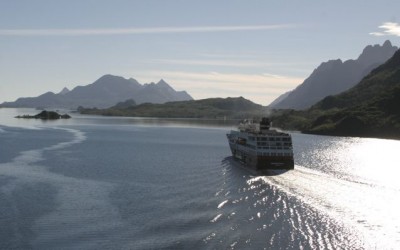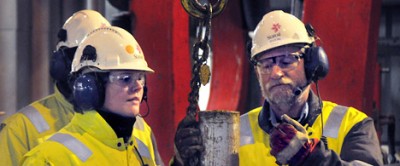The northern city of Hammerfest was being called “the new Stavanger,” a reference to Norway’s oil capital, as reaction and celebration continued following Statoil’s announcement of a huge new oil discovery just 200 kilometers away. The entire northern region is believed to be on the threshold of a new “golden age” of economic development.

“This is a gigantic discovery, and I think there’s more oil in the area,” Hammerfest Mayor Alf Jakobsen told newspaper Dagens Næringsliv (DN), after Statoil officials said they think they’ve “cracked the code” on how to find more oil and gas in the Barents Sea. Jakobsen claimed the northern Norwegian county of Finnmark “has jumped up from the first division to the elite league after this oil discovery.”
Civic boosterism aside, Jakobsen is far from alone in his optimism for the area that has a long history of receiving special state advantages and benefits because it’s been viewed as under-developed. To discourage depopulation, Norwegian officials have offered financial incentives to local residents for years.
Now the counties of Finnmark, Troms and Nordland are facing boom times, attracting an influx of jobs and new residents. The cities of Hammerfest, closest to the latest oil discovery on the Skrugard field, along with Tromsø, Harstad, Sandnessjøen, Mosjøen and Mo i Rana are all strategically located to attract oil- and gas-related businesses and investments. Even before this week’s oil discovery, offshore and engineering firm Aker Solutions had announced its decision to build a new regional base in Tromsø.
“For Aker, the oil discovery is a confirmation that our plans for Tromsø are important,” Kjell-Are Vassmyr of Aker Solutions Tromsø told DN. “We have faith in the growth potential and that there will be a lot to do here for everyone.”

Statoil’s chief executive, Helge Lund, also has said that the oil discoveries off northern Norway will lead to major investment on the mainland as well, and business for local companies. “We’ve already seen what oil has done for western Norway (Vestlandet), and the considerable infrastructure and development that will be needed,” Lund said.
Runar Sjåstad, county administrator for Finnmark, called the discovery “great news” and also expects massive economic development. “Even though we’re talking about national resources here, we have great expectations that this discovery will have wide regional ripple effects,” Sjåstad told DN. Geir Seljeseth of the national oil industry trade association Olf (Oljeindustrienslandsforeining), said the oil activity “will mean a lot for Northern Norway,” generating “many new jobs” in the area.
They won’t just be in the oil and offshore business, but construction, retailing, hotel operations and other support industries as well. Some investors and real estate developers secured property even before Statoil’s discovery, including Stein Erik Hagen and Bjørn Rune Gjelsten, among Norway’s wealthiest men. They’re involved in projects in Hammerfest, where, for example, Statoil’s partner ENI of Italy plans to move into a new local headquarters building on the waterfront.
Competition for property is also keen in Harstad, Tromsø and Sandnessjøen. In addition to office space, there will be new demand for housing, shopping centers and hotels.
Statoil and other oil companies believe there’s more oil waiting to be found in the Barents. Knut Harald Nygård, exploration chief at Statoil’s base in Harstad, said the history of dry wells in the Barents has shown that the so-called “elephant” (the really big discovery) can lie nearby. That’s why Lund said Statoil, which has made two major oil discoveries in the Barents in the past nine months after years of persistence, has “begun to crack the code” in the Barents.
Foreign Minister Jonas Gahr Støre, long a promoter of the northern areas, has tried to dampen what he called “myths” about the area, though, and downplay any “wild west” territorial grabbing in the Arctic. He’s been in the US oil capital of Houston and Washington this week, and denied there’s a grab for resources among nations with Arctic territory.
There is a scramble by companies seeking to position themselves in the area. And he seemed proud to talk about last year’s major discovery at Skrugard, even before Statoil announced the new one. He sees possibilities for new gas lines heading south from the Barents.
Views and News from Norway/Nina Berglund
Please support our stories by clicking on the “Donate” button now:

